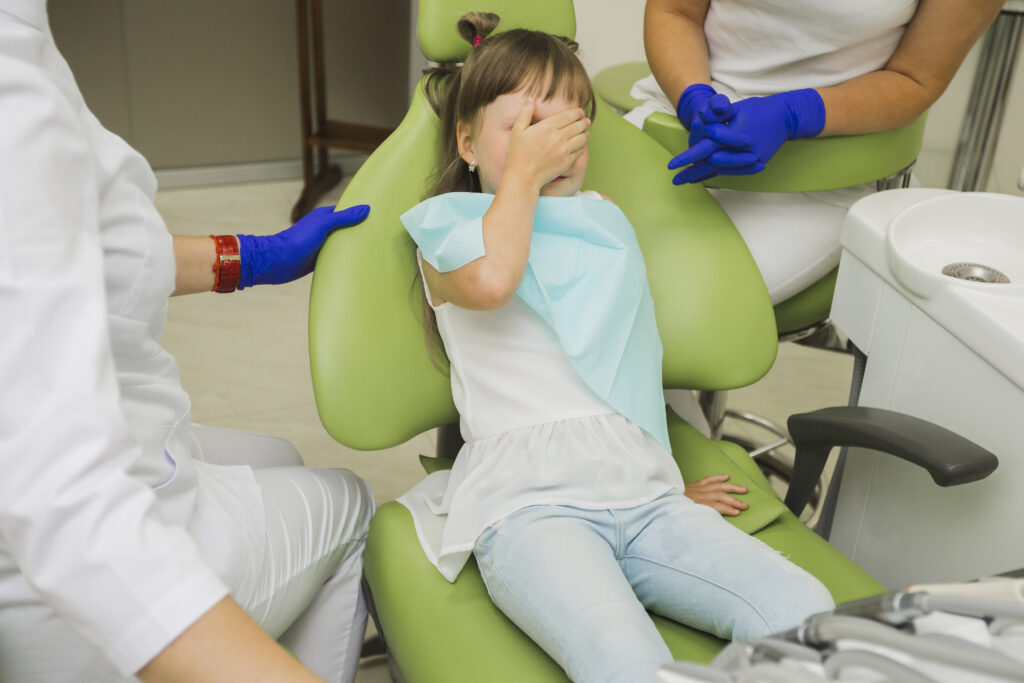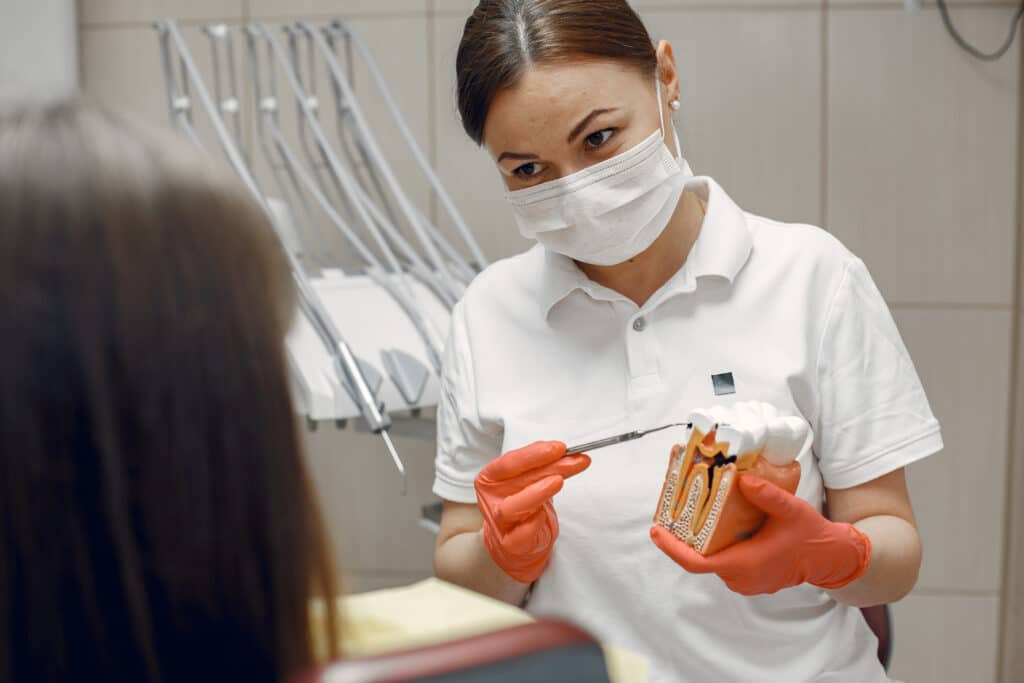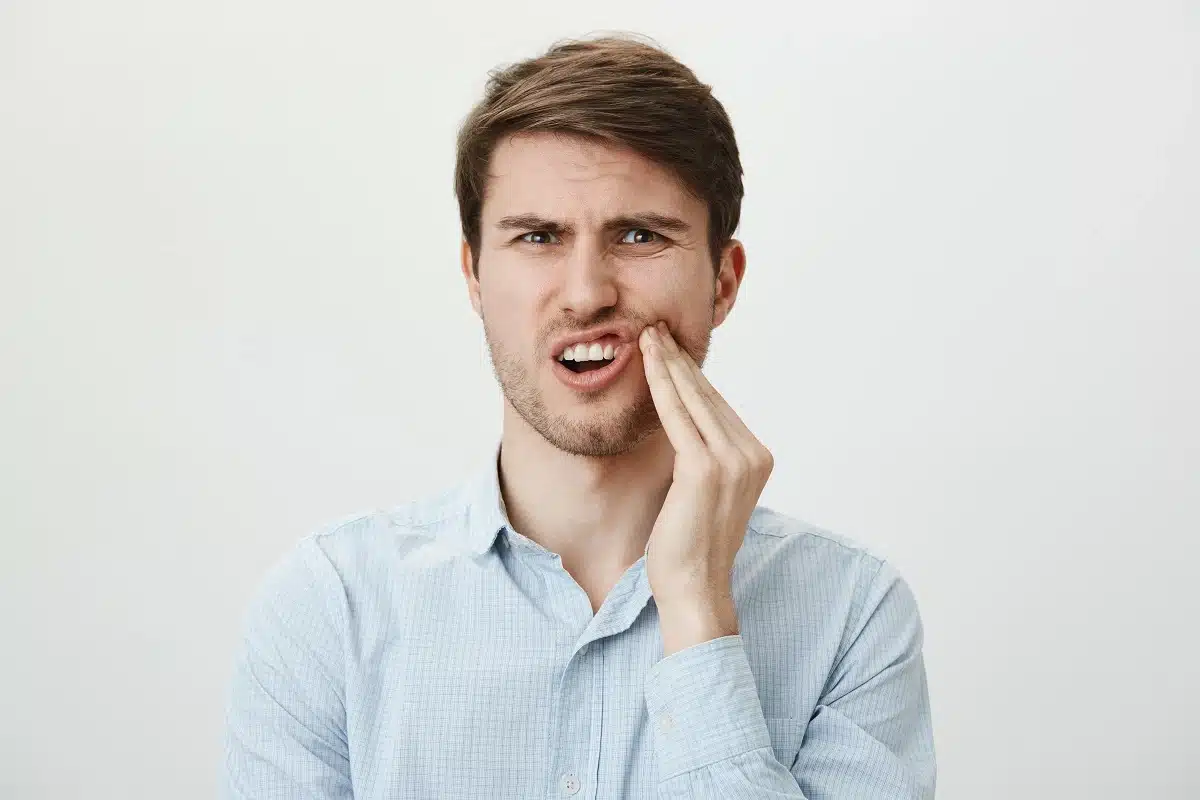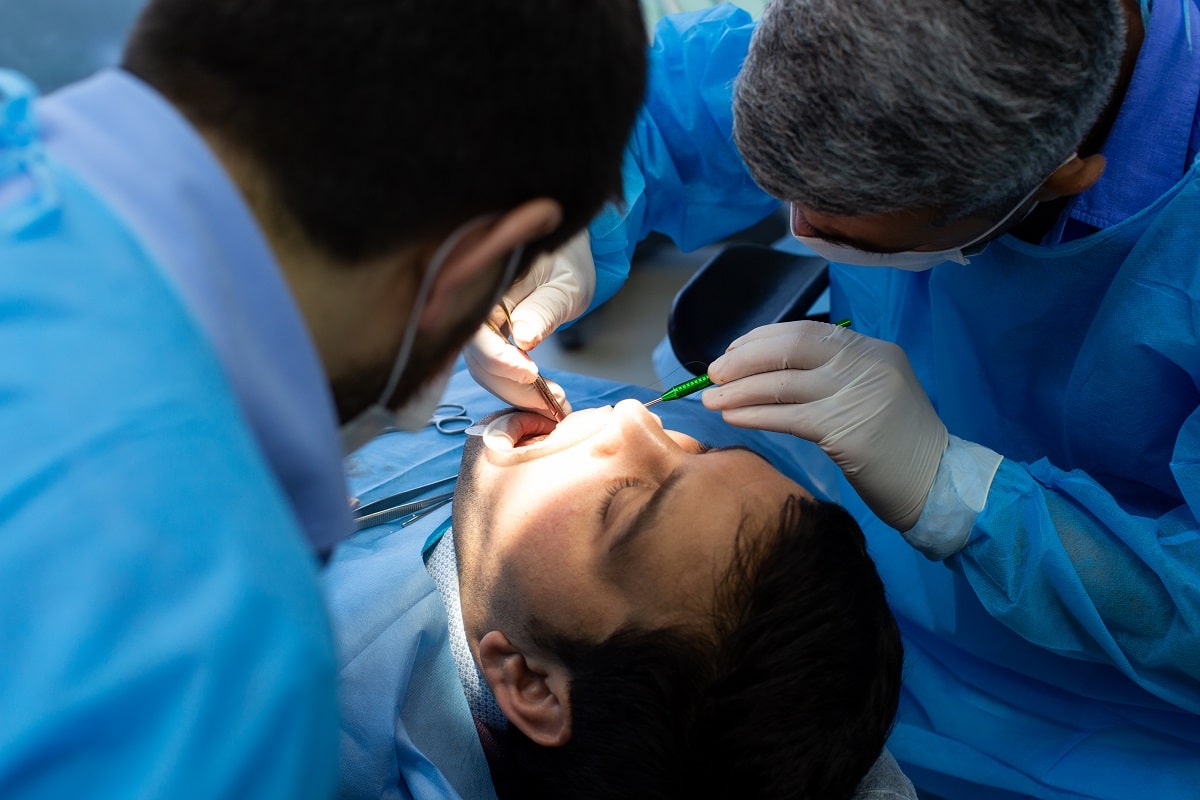Any dental issue that needs to be addressed right away is considered an dental emergency issues are not always life-threatening. However, you require emergency dental care if you have fractured face bones, uncontrollable bleeding, or discomfort that does not improve with medicine.
Procedure for a dental emergency
The first thing you should do in the event of a dental emergency is contact your dentist for additional guidance. If it’s after regular business hours, you can phone the emergency number provided by many dentists. Visit your closest emergency hospital or urgent care facility if you don’t have a dentist.
What qualifies as an emergency in dentistry?
Dental emergencies include, for example:
- Intense toothache.
- Badly cracked tooth.
- Shattered/Knocked-out tooth.
- Partially dislodged tooth that was extruded.
- Dental abscess (swelling of your face and jaw).
- Damaged or missing dental crown.
- Severe damage to sensitive tissues (like deep cut or busted lip).
Until you visit your dentist, you can handle each of these dental emergencies as follows:
Intense toothache
First, give yourself a good oral wash with warm water. To get rid of any stuck food, use dental floss. Use a cold compress on the outside of your mouth or cheek if your mouth is swollen. Use over-the-counter analgesics such ibuprofen, naproxen, or acetaminophen. (Aspirin and other painkillers should never be applied directly to your gums or teeth as this could burn the tissue there.) Seek advice from a dentist right away.
Badly cracked tooth
Any tooth fragments that break should be saved and rinsed. Use warm water to rinse your mouth. Use a piece of gauze to the affected region if there is bleeding, and keep it there for ten minutes or until the bleeding stops. To reduce discomfort and swelling around a broken or chipped tooth, apply a cool compress to the outside of your mouth, cheek, or lip. As soon as you can, visit your dentist.
Shattered/Knocked-out tooth
The tooth should be extracted, held by the crown—the portion that is often visible above the gum line—and the tooth root should be cleaned with water. Avoid washing it or removing any tissue pieces that are attached. Attempt to replace your tooth in its socket if you can. Verify the direction it is facing. Never yank it into position. If you are unable to place your tooth back into its socket, place it in a small bottle of milk (or, in the event that milk is not available, a cup of water with a pinch of table salt) or a product called Save-a-Tooth® that contains cell development medium. See your dentist as soon as possible in all situations. A knocked out tooth that is restored to its socket in less than an hour has the best chance of being saved by your dentist.
Partially dislodged tooth that was extruded
Make an immediate appointment with your dentist. Apply a cool compress to the afflicted cheek or the outside of your mouth to reduce pain until you can see your dental emergency. If necessary, take an over-the-counter pain treatment such as ibuprofen, naproxen, or acetaminophen.
Dental abscess
Abscesses are inflamed regions or infections that resemble pimples that develop around a tooth’s base or in the area between your teeth and gums. A dangerous ailment that can harm neighbouring teeth and tissue called an abscess. If left untreated, the infection may spread to other regions of your body or cause swelling in your jaw or face. You should visit your dentist right away if you suspect you have a dental abscess. Try washing your mouth several times a day with a mild salt-water solution (1/2 teaspoon table salt in 8 ounces of water) to help reduce the pain and encourage the pus to come to the surface.
Damaged or missing dental crown
Sometimes, Old dental restorations may occasionally break loose or come loose. Use an over-the-counter dental cement or insert a piece of sugar-free gum (sugar-filled gum can hurt) into the cavity if you have a fractured or missing filling. Consult a dentist as soon as you can.
Make an appointment as soon as possible to see your dentist if you have a damaged dental crown or bridge, and don’t forget to bring the restoration. Reinstall your restore if at all possible. To assist keep the restoration in place, treat the inside surface beforehand with denture glue, toothpaste, or dental cement that can be purchased over-the-counter. Avoid using “super glue”!
Severe damage to sensitive tissues
Bleeding can occur from injuries to the soft tissues, which include your lips, tongue, cheeks, and gums. Following these steps will help to stop the bleeding:

- Use a small amount of salt water to rinse your mouth.
- Apply pressure to the bleeding spot with a moistened piece of gauze or a caffeinated tea bag. Tent for fifteen to twenty minutes. Tannic acid, which is present in tea, helps to constrict blood vessels and reduce bleeding.
- Apply a cold compress to the outside of your mouth or cheek for five to ten minutes on the afflicted area to stop the bleeding and ease pain.
- See your dentist straight away or visit the emergency department of a hospital if the bleeding doesn’t stop. Keep applying pressure to the bleeding area. Until your dentist sees you, keep applying pressure with the gauze on the bleeding location.
If you’re not sure if your tooth problem is an emergency, what should you do next?
Not all circumstances are dental emergency, though. Stated alternatively, you can wait for a dentist appointment during regular business hours, but you should still schedule one as soon as possible. Concerns that fall outside the category of dental emergency include:
- Dull or moderate dental pain.
- A little fracture or chip in a tooth.
- Braces broken.
- Something lodged in your dental arch.
- Minor soft tissue damage, such as a tiny cut or irritation.
But keep in mind that you should consult a dentist or other medical professional straight away if you have serious bleeding or pain.
How should I treat my problems till I visit the dentist?
Dull toothache: Swish some warm water over your mouth. Put some floss between your teeth to see if anything is stuck there.Use an over-the-counter analgesic, such as ibuprofen, naproxen, or acetaminophen. Aspirin should never be placed directly on the gums. Your tissue will be burned by it. Make an appointment with your dentist by calling them.
A tiny fracture or chip in your teeth: It’s acceptable to wait until your dentist can examine you if you have a chip or crack in your tooth that doesn’t hurt. However, apply orthodontic wax to any sharp edges that can harm your tongue or cheeks. (Most pharmacies have orthodontic wax available in the oral health section.)
Broken braces: Broken braces are often not a dental emergency unless there is bleeding coming from the mouth. Use a pencil eraser or another dull instrument to gently bend the end of any broken wire that is jabbing your tongue or face. Then, until you can see your dentist or orthodontist, wrap the wire with orthodontic wax.
Object lodged between your teeth: Use dental floss or an interproximal brush to carefully remove any objects that may be stuck between your teeth. Never attempt to remove something using a sharp object.
Minor soft tissue damage, such as a tiny cut or irritation: If you have a minor soft tissue injury, thoroughly cleanse your mouth with an antimicrobial mouthwash or saltwater solution. A piece of clean cotton gauze should be used to provide pressure to the affected area.
The bleeding ought to cease after 15 to 20 minutes. After that, you should get medical attention right away if your bleeding is still really bad.
Caring for Children’s dental emergency:
Managing dental emergency involving children requires special consideration and care. Here are some additional tips for caring for children’s dental emergency

Stay Calm and Reassuring
Dentistry For Children can easily pick up on their parents’ emotions, so it’s crucial to remain calm and composed during dental emergencies. Reassure your child that everything will be okay and that you’re there to help them navigate the situation.
Provide Comfort and Distraction
In the event of a Dental emergency, offer comforting gestures such as holding your child’s hand, providing a favorite toy or blanket, or engaging in calming activities together. Distraction techniques, such as storytelling or playing games, can help alleviate anxiety and make the dental visit more manageable for your child.
Be Prepared for the Visit
Pack a small bag with essentials such as snacks, drinks, and activities to keep your child occupied during the waiting period at the dental office. Having familiar items on hand can help your child feel more comfortable in an unfamiliar environment and make the experience less daunting.
Choose Child-Friendly Dental Care
Opt for dental clinics that specialise in Pediatric Dentistry or have experience treating children. These clinics often have child-friendly environments, staff trained to work with children, and amenities designed to make the dental experience more enjoyable for young patients.
When is the right time to visit the ER for dental pain?
You should visit the closest emergency room when tooth pain strikes while your dentist’s office is closed. Until you can see your dentist, the ER staff can assist manage your symptoms.
How may a toothache be treated in an emergency room?
The staff at the emergency room may prescribe antibiotics or analgesics to help with pain and swelling. However, they don’t carry out restorative procedures like crowns or fillings. You still need to see your dentist as soon as they reopen for business after receiving dental emergency care at the ER.
Where to go in case of an urgent dental issue
The majority of dental emergencies, such as a knocked out or shattered tooth, are handled in the dentist’s office. If you have a more serious injury, like a fractured face bone, you should visit the emergency room right away.

The Reasons To Choose Parkmore Family Dental For Your Emergency Dentistry Needs:
- Expert Dentists: Our proficient dental team boasts extensive experience in managing diverse dental emergencies, ensuring top-notch care and effective solutions.
- Cutting-edge Facilities: Equipped with state-of-the-art dental technology and modern amenities, our facilities guarantee the highest standard of care in a comfortable setting.
- Comprehensive Services: From toothaches to dental trauma, our Emergency Dentistry services encompass a wide array of urgent oral health issues, providing comprehensive solutions tailored to your needs.
- Personalised Attention: We prioritise patient satisfaction and comfort, offering personalised care that addresses your concerns and preferences. Our compassionate team ensures prompt and effective treatment for all dental emergencies in Melbourne.
Preparing For Your Dental Emergency Visit:
Preparation is key to ensuring a smooth and efficient emergency dental visit. Here are some essential tips for preparing for your appointment:
Gather Essential Information: Before your dental emergency visit, compile pertinent personal and medical details, including your dental history, allergies, medications, and insurance information. Providing this information to the dental office upon arrival can streamline the registration process and ensure that you receive appropriate care without delay.
Follow Pre-Visit Instructions: Adhere to any pre-visit instructions provided by the dental office, such as taking pain medication or applying cold compresses to alleviate discomfort. Following these instructions can help prepare you for your dental Appointment and ensure optimal outcomes.
Describe Your Dental emergency Clearly: Provide a detailed description of your dental emergency to the dental team, including when the symptoms started, the severity of the pain, and any relevant factors such as trauma or injury. Clear communication with the dental team can help them understand your condition and determine the most appropriate course of action.
Bring a Companion: If possible, try to bring a dependable friend or relative with you to your urgent dental appointment. Having a companion can provide emotional support, assist with communication, and help you feel more comfortable during your appointment.
Conclusion
In times of Dental emergency, having access to reliable and prompt dental care is paramount. Parkmore Family Dental is dedicated to providing exceptional emergency dentistry services in Melbourne. With a team of highly skilled dentists and state-of-the-art facilities, Parkmore Family Dental is committed to delivering immediate care when you need it most. Our comprehensive emergency services cover a wide range of dental emergencies, from severe toothaches to dental trauma and oral infections. We prioritise patient comfort and satisfaction, ensuring that you receive personalised care tailored to your specific needs. Whether you’re experiencing intense tooth pain, a knocked-out tooth, or any other Dental emergency, you can rely on Parkmore Family Dental for prompt and effective treatment. For any dental emergency, kindly visit the Parkmore Family Dental clinic or Contact Us anytime.
Frequently Asked Questions
Are Dental Emergencies Commonly Associated with Certain Age Groups?
Dental emergencies can occur at any age, but they may be more common among certain age groups. Children and teenagers are often at a higher risk of dental emergencies due to their active lifestyles and participation in sports activities. However, adults and seniors may also experience dental emergencies due to underlying oral health conditions or accidents. Parkmore Family Dental recognizes the diverse age groups affected by dental emergencies and offers tailored emergency dental care to address their specific needs.
How Can I Prevent Dental Emergencies?
To reduce the risk of dental emergencies, it’s essential to maintain good oral hygiene habits, including brushing and flossing regularly and visiting your dentist for routine check-ups and cleanings. Wearing a mouthguard during sports activities, avoiding chewing on hard objects, and refraining from using teeth as tools can also help prevent dental injuries. Parkmore Family Dental emphasizes preventive measures and provides comprehensive oral care to help patients avoid dental emergencies.
Is Emergency Dental Care Available for Non-Residents or Visitors?
Yes, emergency dental care is typically available for non-residents or visitors. Dental emergencies can occur at any time, regardless of residency status. Many emergency dental clinics welcome walk-in patients and provide immediate care for urgent oral health issues, regardless of where you live. Parkmore Family Dental offers emergency dental care services for both residents and visitors. Visit Parkmore Family Dental’s website for prompt assistance.
Can Emergency Dentists Provide Pain Management for Severe Toothaches?
Yes, emergency dentists can provide pain management for severe toothaches. Depending on the cause of the toothache, treatment options may include prescribing pain medication, performing root canal therapy, or extracting the affected tooth. Parkmore Family Dental’s experienced emergency dentists will assess your condition and recommend the most appropriate treatment to alleviate your pain.
Are There Any Home Remedies to Temporarily Relieve Dental Pain?
While awaiting emergency dental care, you can try home remedies to temporarily relieve dental pain. These may include rinsing your mouth with warm saltwater, applying a cold compress to the affected area, taking over-the-counter pain medication, or using clove oil to numb the pain. However, it’s essential to seek professional dental care for a thorough evaluation and proper treatment of the underlying cause. Parkmore Family Dental offers comprehensive emergency dental services to address your urgent oral health needs. Contact us or visit our website for more information on emergency dental care




